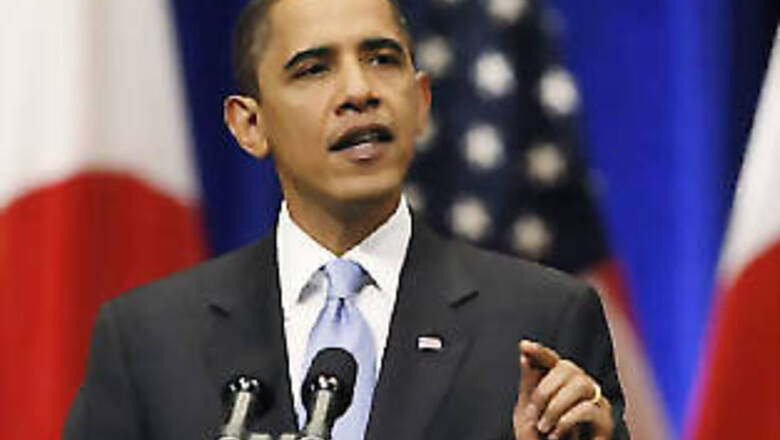
views
Tokyo: President Barack Obama pledged to pursue pragmatic cooperation with China, engage more deeply in Asia and push for deeper trade ties with the region in a major speech in the Japanese capital on Saturday.
Tokyo is the first stop in Obama's nine-day Asian tour, which also takes him to Singapore for an Asia-Pacific summit, to China for talks likely to feature climate change and trade gaps, and to South Korea, where the North's nuclear ambitions will be in focus.
Obama, on his first trip to Asia since becoming leader, reaffirmed Washington's decades-old alliance with Japan, strained lately by a row over a US military base and questions about the future of the ties as both countries adapt to a rising China. "But while our commitment to this region begins in Japan, it does not end here," Obama told an audience of about 1,500 people.
"So I want every American to know that we have a stake in the future of this region. This is where we engage in much of our commerce and buy many of our goods. "And this is where we can export more of our own products and create jobs back home in the process," said the Hawaii-born Obama, dubbing himself America's first "Pacific President".
Obama, who must manage the strains in ties with a rising China, welcomed Beijing's growing global role. "So the United States does not seek to contain China, nor does a deeper relationship with China mean a weakening of our bilateral alliances.
On the contrary, the rise of a strong, and prosperous China can be a source of strength for the community of nations," he said, adding he would seek improve communication between the two countries' militaries. "Of course, we will not agree on every issue, and the United States will never waver in speaking up for the fundamental values that we hold dear -- and that includes respect for the religion and cultures of all people." Obama has been criticised by some who believe he is downplaying human rights issues.
NUCLEAR DETERRENT, ECONOMIC IMBALANCES
The president, expected to take up climate change in China -- one of the world's top two greenhouse gas emitters with the United States, also urged developing nations to take "substantial actions" to curb the emissions that are causing global warming.
"I have no illusions that this will be easy, but the contours of a way forward are clear. All nations must accept their responsibility," he said in his speech. Obama reiterated his call for a world free of nuclear weapons to applause from his audience in Japan, the only country to have suffered atomic bombings.
But he vowed to maintain the U.S. nuclear deterrent as long as it was needed. "Now let me be clear: so long as these weapons exist, the United States will maintain a strong and effective nuclear deterrent that guarantees the defence of our allies, including South Korea and Japan," he said.
Obama also urged an unpredictable North Korea to return to stalled multilateral talks on its nuclear programme. "We will not be cowed by threats, and we will continue to send a clear message through our actions, and not just our words: North Korea's refusal to meet its international obligations will lead only to less security, not more," he said.
Obama reiterated his call to redress the economic imbalances blamed by many for the global financial crisis. "First, we must strengthen our economic recovery, and pursue growth that is both balanced and sustained," he said. "Now that we are on the brink of economic recovery, we must also ensure that it can be sustained. We simply cannot return to the same cycles of boom and bust that led us into a global recession.
We cannot follow the same policies that led to such imbalanced growth." Fresh government figures on the US trade deficit could add urgency to Obama's efforts to seek greater export opportunities in China and other Asian countries.
America's trade gap ballooned in September by 18.2 percent to $36.5 billion, according to US Commerce Department figures released in Washington on Friday.
It was the largest monthly increase in more than 10 years, driven by higher oil prices and a surge in imports from China.
The import growth may reinforce US concerns that China's currency is undervalued against the dollar, which US manufacturers say gives Chinese companies an unfair trade advantage.




















Comments
0 comment